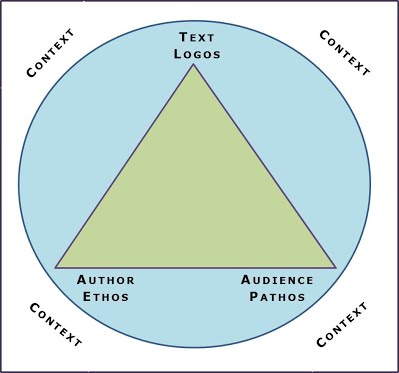
Rhetoric will be the focus of reading and writing throughout the second quarter. In order to maximize your understanding and perspective, you need to have a foundation for rhetorical strategies.
Rhetorical Triangle:
Ethos, Pathos, and Logos are modes of persuasion used to convince audiences. They are also referred to as the three artistic proofs (Aristotle coined the terms), each represented by Greek words.
Ethos or the ethical appeal, means to convince an audience of the author’s credibility or character.
An author would use ethos to show to his audience that he is a credible source and is worth listening to. Ethos is the Greek word for “character.” The word “ethic” is derived from ethos.
Ethos can be developed by choosing language that is appropriate for the audience and topic (also means choosing proper level of vocabulary), making yourself sound fair or unbiased, introducing your expertise or pedigree, and by using correct grammar and syntax.
Pathos or the emotional appeal, means to persuade an audience by appealing to their emotions.
Authors use pathos to invoke sympathy from an audience; to make the audience feel what the author wants them to feel. A common use of pathos would be to draw pity from an audience. Another use of pathos would be to inspire anger from an audience; perhaps in order to prompt action. Pathos is the Greek word for both “suffering” and “experience.” The words empathy and pathetic are derived from pathos.
Pathos can be developed by using meaningful language, emotional tone, emotion-evoking examples, stories of emotional events, and implied meanings. Aristotle described catharsis, the purging of emotion, as a necessary condition of an effective plot. Catharsis can thus be most appreciated by pathos.
Logos or the appeal to logic, means to convince an audience by use of logic or reason.
To use logos would be to cite facts and statistics, historical and literal analogies, and citing certain authorities on a subject.Logos is the Greek word for “word,” however the true definition goes beyond that, and can be most closely described as “the word or that by which the inward thought is expressed, Lat. oratio; and, the inward thought itself, Lat. Ratio. (1) The word “logic” is derived from logos.
Logos can be developed by using advanced, theoretical or abstract language, citing facts (very important), using historical and literal analogies, and by constructing logical arguments.
In written expression rhetoric, the art of persuasion, is a consequence of a writer’s ability to master ethos, pathos, logos.
